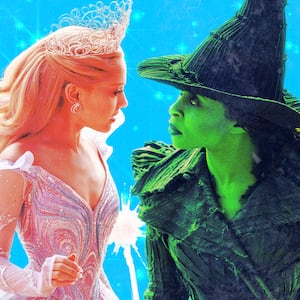(Warning: Spoilers ahead.)
One of the last things 22-year-old Paul Murdaugh did before he was shot dead on June 7, 2021, was send a text message recommending A Star is Born to a friend.
This evidence isn’t the smoking gun that placed his father, Alex Murdaugh, at the scene in the minutes before Paul and his mother were murdered. Still, it was part of the trove of cell phone data that painted a picture of the crucial last moments of Paul and Maggie’s lives, helping to convict Alex in 2023 of the double homicide.
Hulu’s eight-part limited series Murdaugh: Death in the Family opens with Alex’s (Jason Clarke) 911 call after he “discovered” Maggie (Patricia Arquette) and Paul’s (Johnny Berchtold) bodies at the kennels on the Moselle estate. It concludes with Alex in his jail cell replaying the events of that violent June night. Whereas a previous episode depicted this bloody sequence with an unknown assailant, the finale depicts the now convicted Alex murdering his wife and child.
“It was informative, but at the same time, it was really, really heavy, because I have his last text messages, and it feels invasive, almost,” Berchtold tells The Daily Beast’s Obsessed. “But it’s so important to hold on to, because it details a time, a space, a moment in his life where he didn’t know what was coming. I got to see truly who he was at that point in time; what he was talking about, and how he was out there to record a video of his friend’s dog.”

The circumstances informed Berchtold so much about that fateful evening: “We have to imagine some of those moments that are between the resources and information that’s out there, but it helped fill that in for me in a way that you don’t get on many projects.”
The concluding episode takes place during Alex’s trial, when the case had long been dominating headlines about the downfall of the prominent South Carolina legal dynasty. I, like many others, was hooked on Mandy Matney’s Murdaugh Murders Podcast during this period, so I came to Michael D. Fuller and Erin Lee Carr’s adaptation of Matney’s in-depth reporting feeling pretty informed. I quickly realized that there is even more lingering beneath the surface.
The specificity of Paul’s movie recommendation is one such example of how the material zeros in on granular details to peel back the layers. “It was holding on to those things like, ‘Oh, man, he liked A Star Is Born so much that he’s recommending it,” says Berchtold. “It hits my heart at least. It fills in a broader picture of a human being that I think has been so eviscerated by opinion.”

Berchtold also thought he knew the story inside out when he signed on to play Paul Murdaugh. Then, he was handed a 400-page research packet revealing a young man who was both a perpetrator of a crime and a victim. Part of this trove of information was those last text messages. It also contained family photos showing the generational cycle of the Murdaughs, as well as Paul’s underage drinking: “It clued me into that culture and upbringing, and what it must have been like for a kid.”
Living without consequences was a theme. Well, that was until 2019, when an intoxicated Paul was in a boat crash (and alleged to be behind the wheel) that killed his friend’s girlfriend, Mallory Beach (Madeline Popovich). Alex’s attempts to throw money and his power to make this all go away are one thread in the great unraveling of the powerful South Carolina family; Alex’s addiction to pain meds and embezzling money from clients are other contributing factors. Steering the narrative away from his mounting financial crimes and to gain sympathy is the motive given by prosecutors in real life and the series.
Given the attention the Murdaugh family has generated, Berchtold had concerns that the creators quickly alleviated. “When I got to hear their [Fuller and Carr’s] take on the story really eased my trepidations, because it was humanity first,” says Berchtold, “It was coming from the standpoint of just trying to understand. I think that’s why true crime is so fascinating; it holds a mirror up to our own humanity.”

Part of the horror and fascination with Alex lies in the lengths he went to in order to hide his financial crimes. “With their pitch of it being more centered around this family dynamic and filling in those gaps in between the big headline moments, it eased my nerves,” says Berchtold. “I knew that it was going to be a very well-thought-out experience. When I watch it, I think it shows.”
The sixth episode shows Maggie and Paul as the only people at the kennels, whereas the finale reveals Alex was there the whole time. “What was exciting from a filmmaking standpoint was that we filmed it all as one big sequence,” says Berchtold. “If you were to take that raw footage of Paul walking into the feed room, the camera then pans, and Alex is standing there. But if you cut that, then you don’t get Alex in the scene.”
Doing it like this allowed the actors to focus and “stay in the sequence.” When Berchtold watched Episode 6, he noticed there are “glances, looks, reactions that we have that clue in to another person being there, but you wouldn’t notice that, because that’s not the context that we’re seeing it in.”
Whereas the boat crash was filmed early in the production schedule, Paul and Maggie’s murders were the last thing Berchtold shot. With it looming, Berchtold recalls having a pit in his stomach about this sequence, and was surprised that his nerves disappeared on the day.

“I set shooting the sequence up in my head to be this scary—it still was very heavy—headspace that I was going to have to be in, and then I was on set with Patricia, it wasn’t like that at all,” says Berchtold. “It was really surprising. It was such a weird mix of emotions and headspaces that I didn’t prep myself for. ”
Berchtold credits Arquette for setting the tone. “It hit me, well, okay, Paul and Maggie didn’t know it was coming, and I realized Patricia was giving that energy; that sense of ease and that comfort, which made me feel that way.”
By this point, Berchtold had formed a bond with his on-screen mother. When they met, Berchtold’s status as a horror aficionado bubbled to the surface. “The first thing I said to Patricia Arquette was, ‘I love you in A Nightmare on Elm Street 3: Dream Warriors,’ and she went, ‘What?!”
Quickly, they developed a familial connection, aided by activities off set. Arquette suggested doing an escape room with Clarke, Berchtold, and Will Harrison (who plays Paul’s older brother, Buster). Berchtold previously worked in an escape room (where he crossed paths with Murdaugh co-star Brittany Snow in 2016), so he took charge. It didn’t quite go according to plan, but it made for a memorable experience.

“Patricia and Jason’s kids were in town, and we did a big family outing. I picked this medieval escape room. I thought it was going to be wizards and knights. Turns out it was a medieval torture chamber-themed. I was horrified,” Berchtold says. “I was like, ‘I’m done for.’ Luckily, it only made us bond stronger. They understood the importance of that chemistry and spent a lot of time with us.”
For the record, they did escape before the time ran out.
On another occasion, Berchtold and Harrison took Arquette to a wrestling show. “I was sweating bullets because I was like, this has to be the greatest thing she’s ever experienced, or again, I’m done for,” he says. “She stepped in, she took one look around, and Will and I made eye contact like, ‘What’s she about to say?’ And she goes, ‘This is the best thing I’ve ever seen.’”
On the other end of the on-screen parenting spectrum, Paul comes face-to-face with his gun-toting father. After all this time building up a relationship with Clarke, I ask what it was like working opposite the Australian actor during the harrowing murder sequence.
“If it were a different person, it could have been a very different shoot. I’m so grateful that it was Jason, because he could have been an absolute monster off camera,” says Berchtold. “He truly could have, and he wasn’t. He was so respectful of what we were doing and never once made it feel like I wasn’t in a protected environment.”
Berchtold says he will forever remember watching Clarke play “a person as visceral and as intense as Alex” and still leading with integrity to make the set “safe and enriching.” We have all read stories about actors who embody their character when cameras aren’t rolling, but Murdaugh: Death in the Family is not adding new entries to this ongoing narrative.
“Actors are emotional people. I get it to a certain extent, but you don’t need to make an experience terrible for the people you’re trying to craft something with,” says Berchtold. “Especially when it involves a story inspired by this real, heartbreaking, tragic event. I’m really grateful that he is who he is.”
Even after wrapping as Paul, Berchtold lingered off-camera during the trial. “It was captivating to watch all of these people I’ve grown to know and love give really incredible performances,” he says. Because the schedule had shifted, the last day of production coincidentally fell on June 7—the anniversary of Paul and Maggie’s murders.
“You felt it on that set. The last thing that they filmed was the verdict, and so there was an immense amount of respect on that day,” says Berchtold. “There was so much of the cast there too, and I think everyone across the board felt that, which was a singular experience to be a part of.”









